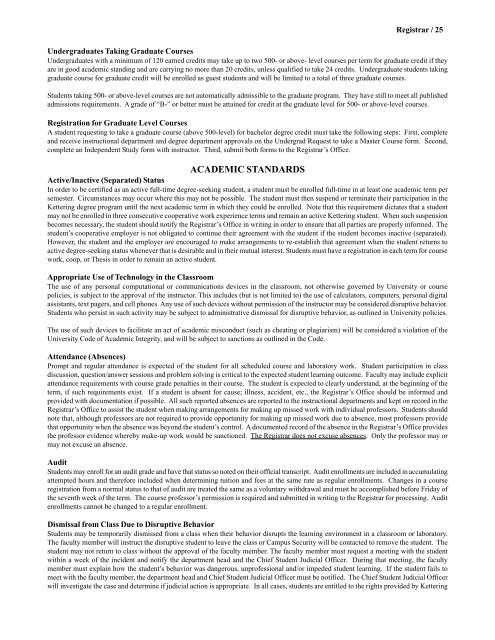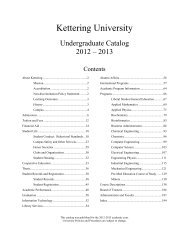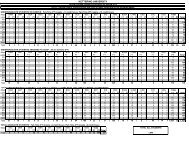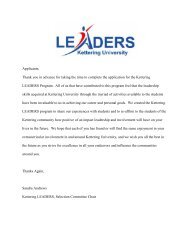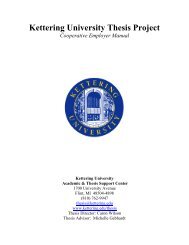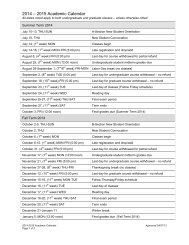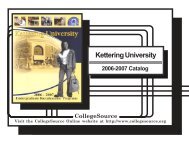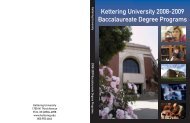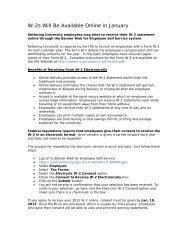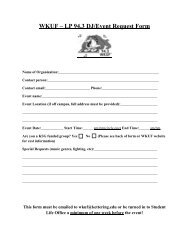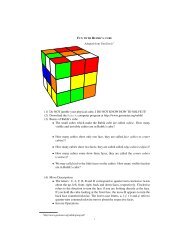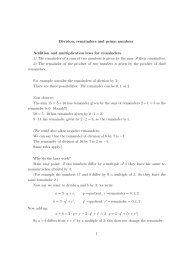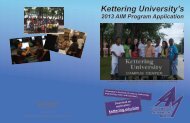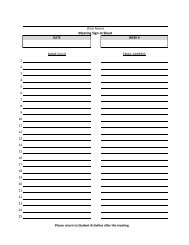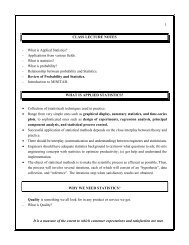2007-2008 Undergraduate Catalog - Kettering University
2007-2008 Undergraduate Catalog - Kettering University
2007-2008 Undergraduate Catalog - Kettering University
Create successful ePaper yourself
Turn your PDF publications into a flip-book with our unique Google optimized e-Paper software.
Registrar / 25<br />
<strong>Undergraduate</strong>s Taking Graduate Courses<br />
<strong>Undergraduate</strong>s with a minimum of 120 earned credits may take up to two 500- or above- level courses per term for graduate credit if they<br />
are in good academic standing and are carrying no more than 20 credits, unless qualified to take 24 credits. <strong>Undergraduate</strong> students taking<br />
graduate course for graduate credit will be enrolled as guest students and will be limited to a total of three graduate courses.<br />
Students taking 500- or above-level courses are not automatically admissible to the graduate program. They have still to meet all published<br />
admissions requirements. A grade of “B-” or better must be attained for credit at the graduate level for 500- or above-level courses.<br />
Registration for Graduate Level Courses<br />
A student requesting to take a graduate course (above 500-level) for bachelor degree credit must take the following steps: First, complete<br />
and receive instructional department and degree department approvals on the Undergrad Request to take a Master Course form. Second,<br />
complete an Independent Study form with instructor. Third, submit both forms to the Registrar’s Office.<br />
ACADEMIC STANDARDS<br />
Active/Inactive (Separated) Status<br />
In order to be certified as an active full-time degree-seeking student, a student must be enrolled full-time in at least one academic term per<br />
semester. Circumstances may occur where this may not be possible. The student must then suspend or terminate their participation in the<br />
<strong>Kettering</strong> degree program until the next academic term in which they could be enrolled. Note that this requirement dictates that a student<br />
may not be enrolled in three consecutive cooperative work experience terms and remain an active <strong>Kettering</strong> student. When such suspension<br />
becomes necessary, the student should notify the Registrar’s Office in writing in order to ensure that all parties are properly informed. The<br />
student’s cooperative employer is not obligated to continue their agreement with the student if the student becomes inactive (separated).<br />
However, the student and the employer are encouraged to make arrangements to re-establish that agreement when the student returns to<br />
active degree-seeking status whenever that is desirable and in their mutual interest. Students must have a registration in each term for course<br />
work, coop, or Thesis in order to remain an active student.<br />
Appropriate Use of Technology in the Classroom<br />
The use of any personal computational or communications devices in the classroom, not otherwise governed by <strong>University</strong> or course<br />
policies, is subject to the approval of the instructor. This includes (but is not limited to) the use of calculators, computers, personal digital<br />
assistants, text pagers, and cell phones. Any use of such devices without permission of the instructor may be considered disruptive behavior.<br />
Students who persist in such activity may be subject to administrative dismissal for disruptive behavior, as outlined in <strong>University</strong> policies.<br />
The use of such devices to facilitate an act of academic misconduct (such as cheating or plagiarism) will be considered a violation of the<br />
<strong>University</strong> Code of Academic Integrity, and will be subject to sanctions as outlined in the Code.<br />
Attendance (Absences)<br />
Prompt and regular attendance is expected of the student for all scheduled course and laboratory work. Student participation in class<br />
discussion, question/answer sessions and problem solving is critical to the expected student learning outcome. Faculty may include explicit<br />
attendance requirements with course grade penalties in their course. The student is expected to clearly understand, at the beginning of the<br />
term, if such requirements exist. If a student is absent for cause; illness, accident, etc., the Registrar’s Office should be informed and<br />
provided with documentation if possible. All such reported absences are reported to the instructional departments and kept on record in the<br />
Registrar’s Office to assist the student when making arrangements for making up missed work with individual professors. Students should<br />
note that, although professors are not required to provide opportunity for making up missed work due to absence, most professors provide<br />
that opportunity when the absence was beyond the student’s control. A documented record of the absence in the Registrar’s Office provides<br />
the professor evidence whereby make-up work would be sanctioned. The Registrar does not excuse absences. Only the professor may or<br />
may not excuse an absence.<br />
Audit<br />
Students may enroll for an audit grade and have that status so noted on their official transcript. Audit enrollments are included in accumulating<br />
attempted hours and therefore included when determining tuition and fees at the same rate as regular enrollments. Changes in a course<br />
registration from a normal status to that of audit are treated the same as a voluntary withdrawal and must be accomplished before Friday of<br />
the seventh week of the term. The course professor’s permission is required and submitted in writing to the Registrar for processing. Audit<br />
enrollments cannot be changed to a regular enrollment.<br />
Dismissal from Class Due to Disruptive Behavior<br />
Students may be temporarily dismissed from a class when their behavior disrupts the learning environment in a classroom or laboratory.<br />
The faculty member will instruct the disruptive student to leave the class or Campus Security will be contacted to remove the student. The<br />
student may not return to class without the approval of the faculty member. The faculty member must request a meeting with the student<br />
within a week of the incident and notify the department head and the Chief Student Judicial Officer. During that meeting, the faculty<br />
member must explain how the student’s behavior was dangerous, unprofessional and/or impeded student learning. If the student fails to<br />
meet with the faculty member, the department head and Chief Student Judicial Officer must be notified. The Chief Student Judicial Officer<br />
will investigate the case and determine if judicial action is appropriate. In all cases, students are entitled to the rights provided by <strong>Kettering</strong>


